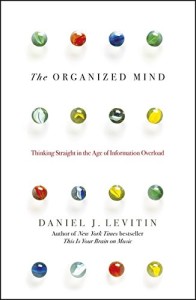 The way we sleep affects us all. Even the most settled of snoozers can suffer and the effect a disturbed night has on the body is quite disturbing.
The way we sleep affects us all. Even the most settled of snoozers can suffer and the effect a disturbed night has on the body is quite disturbing.
So read on to find out what effect poor sleep has on your body and memory, why caffeine and sleeping pills are pointless and the power of naps.
I’ve mentioned neuroscientist Daniel Levitin’s excellent book The Organized Mind previously and he’s excellent on the subject of sleep and how it affects the human body and, most specifically, the mind.
1. Sleep is vital for our memory
Sleep has a lot of important functions one of the main ones being centred around memory and how we retain it. As Levitin explains:
Memory consolidation requires that our brains fine-tune the neural circuits that first encountered a new experience.
This has to be done when we’re asleep, or otherwise the activity in those circuits would be confused with an actually occurring experience.
In fact, as we sleep, our brain performs three separate functions that help us to process all the information we’ve taken in recently.
These are:
- Unitization: combining individual chunks of information into one unified concept (this helps if you’re trying to remember a speech)
- Assimiliation: this is when you learn new stuff and it gets integrated into things you already know
- Abstraction: subsconsious rules that become part of your memory. Like ‘ed’ on the end of a very puts it in the past tense.
For example, sleep helps you to learn new skills or solve problems that you wouldn’t necessarily learn in the same period awake.
2. Memory loss
There are a lot of downsides to poor sleep, though. With memory alone it can totally screw up what you’ve learned or seen.
Disrupted sleep even two or three days after an experience can disrupt your memory of it months or years later.
3. We may not even be sleeping properly
The industrial revolution had a profound affect on the human race. Previously governed by the natural length of days, electricity changed everything.
In the last 20 years, or so, there’s been a rediscovery of what’s now known as ‘bimodal sleep’. This was our natural way of sleeping before the invention of the lightbulb.
Our ancestors engaged in two rounds of sleep… the first round would occur for four or five hours after dinner, followed by an awake period of one or more hours in the middle of the night, followed by a second period of four or five hours of sleep.
This may explain why millions of people find it difficult to sleep straight through the night, even though uninterrupted sleep is the cultural norm.
This great piece from Aeon Magazine goes into much more detail about bimodal sleep.
4. Bad sleep affects our general performance
It’s not just memory that’s affected by failing to get good shuteye, as Levitin notes.
Sleep is among the most critical factors for peak performance, memory, productivity, immune function and mood regulation. Even a mild sleep reduction or departure from a set sleep routine (ie going to bed late one evening or waking up early the next) can produce detrimental effects of cognitive performance for many days afterward.
5. Poor sleep causes accidents
We’ve probably all experienced that level of tiredness – either at work or at home – where we can’t quite do something first time, or we do something silly like putting the butter in the oven, rather than the fridge. Well, that sort of tiredness has far greater ramifications:
in 2009, 250,000 traffic accidents in America were as a result of sleepiness and it’s one of the main causes of friendly fire: soldiers mistakenly shooting people on their own side.
Need further proof?
Sleep deprivation was ruled to be a contributing factor in some of the most well-known global disasters: nuclear power plant disasters at Chernobyl, Three Mile Island, David-Besse and Rancho Seco… the oil spill from Exxon Valdez and the fatal decision to launch the Challenger space shuttle….
6. Bad sleep costs money
Sleep deprivation is estimated to cost US businesses more than $150bn a year in absences, accidents and lost productivity.
That means sleep deprivation would be in the top 60 of countries by GDP.
7. Poor sleep affects our health
Major health conditions can become more common.
Sleep deprivation is associated with increased risk of heart disease, obesity, stroke and cancer.
We just aren’t alert enough and even a small change in your routine can have an impact:
going to bed just one hour late one night, or sleeping in for an hour or two one morning can affect your productivity, immune function and mood significantly for several days.
8. Don’t bother with caffeine or sleeping pills
Those of us who suffer with bad sleep often resort to medical help. Big mistake.
First of all Levitin talks about caffeine:
Caffeine does enhance cognitive function, but only when your sleep is consistent. It may keep you awake if you’re tired, but it won’t keep you alert or performing a peak ability.
In other words, if you’re sleeping well caffeine is great, but it doesn’t really help you if you’re knackered.
Sleeping pills aren’t much better, either. We all assume they help us get the sleep we so desperately crave. Not so…
Sleeping pills are no better at the other end of the spectrum. They’ve been shown to be counter productive to both sleep and productivity.
In one study, sleeping pills allowed people to sleep only 11 minutes longer on average. Moreover, the quality of sleep is disturbed and is poor, so it affects memory consolidation.
So the lesson is, try to improve your sleep by regular methods, rather than resorting to chemical enhancements.
9. Improve your life by taking a nap
In the UK and US, we often mock people who nap, but 40 winks have been shown to be hugely beneficial.
The power nap has been talked about for a long time and it appears to be true.
Providing your nap is no longer than 40 minutes (and 5-10 is ideal) it can help your creativity, efficiency and memory. It can even turn round negative emotions.
Naps have also been shown to reduce the incidence of heart disease, diabetes, stroke and heart attacks.
Caution: a morning snooze is not the same as a nap, and a nap too close to bedtime is likely to affect your ability to fall asleep at night.
—
Daniel Levitin’s The Organized Mind is full of really interesting insights into the brain and is definitely worth a read.
Every Sunday, I send out a newsletter with links to some of the most engaging stories and best wisdom I’ve seen in the past 7 days: Sign up for your weekly dose today.

 I’m currently reading
I’m currently reading